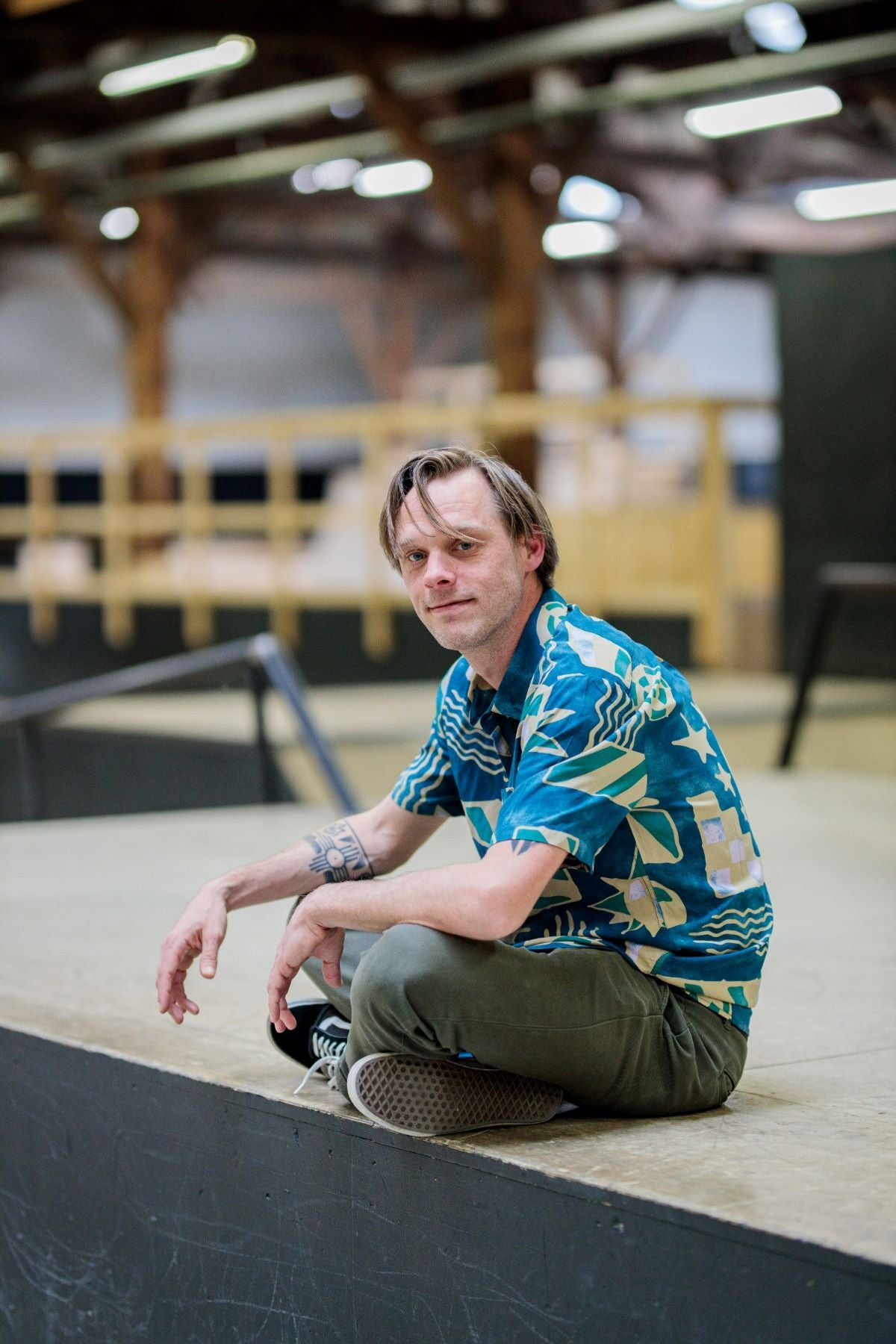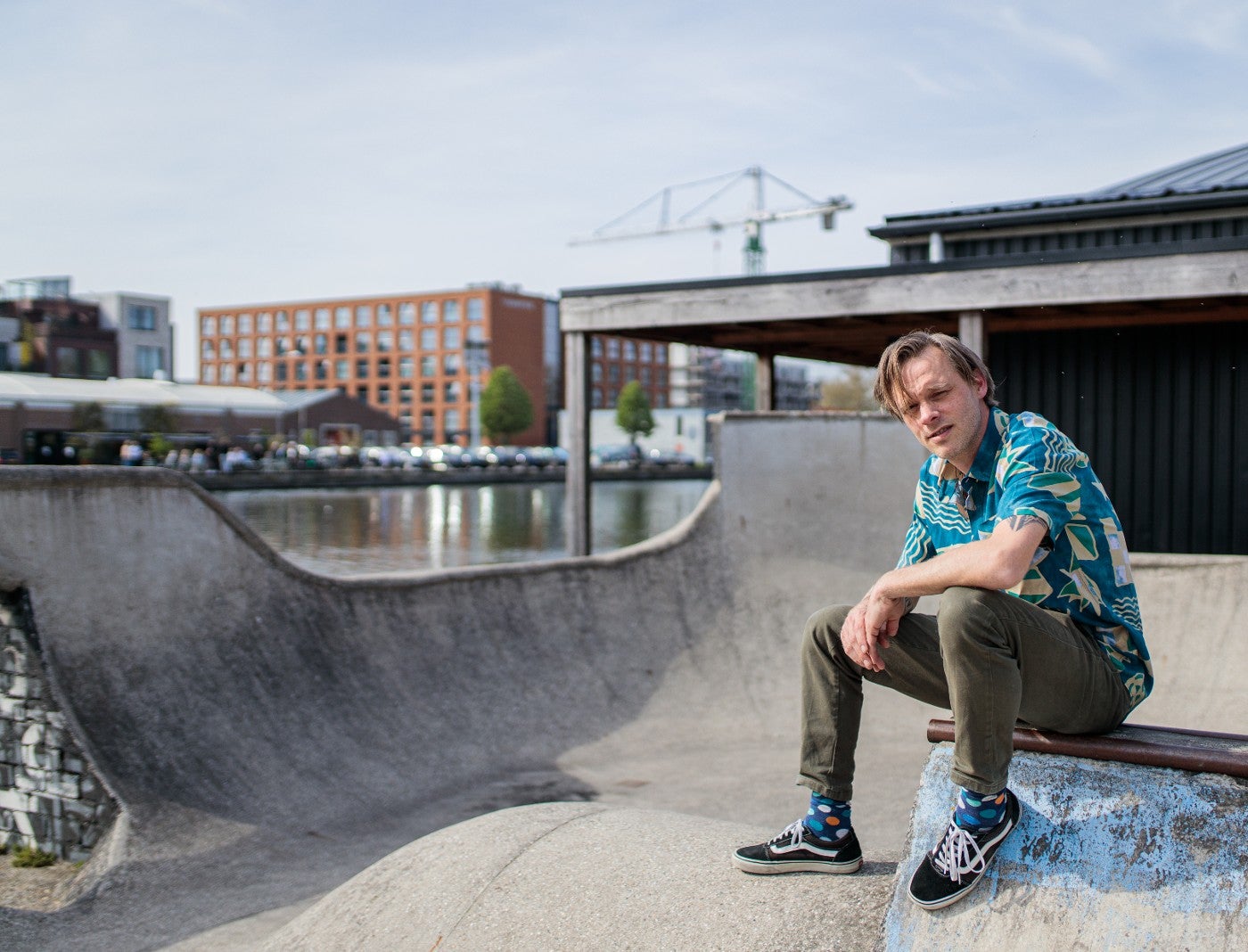The life of Fabian Schrijver (38), singer of eight-member hip-hop collective Primaat, has been anything but straightforward. He wrote poetry during a dark spell in his life, joined the navy and spent time as a youth worker. And yet a common thread runs through all his pursuits: the search for connection. ‘In retrospect, all my impulsive choices were perfectly in keeping with the person I was growing into.’
You’re playing the Déjà VU Festival on 15 June. How would you describe your music for people who may not be familiar with it?
„All our songs, from loud to laid-back, are full of energy that flows between the band members, and between us and the audience. The positive atmosphere between the eight of us cannot be faked, and it sparks something in the audience. On King's Day, we performed in front of 4,000 people. When I asked who knew us at the start of the show, about fifteen people raised their hands. It wasn’t long before the whole place was bouncing."
I read that your band was formed during the COVID-19 outbreak. How did that happen?
„Ha, that’s right. Two of our band members were living in an old Chinese restaurant at the time as property guardians. It was an incredibly evocative location: the whole restaurant was red, there were golden chandeliers, and the old menu signs were still in place. The room was massive, so we could easily make music and observe social distancing at the same time. It was a brilliant time. We locked ourselves up for days, eating and sleeping in the restaurant. There was no one to disturb us. We had a lot of time to discover our musical identity. Before that, we had only seen each other at jam sessions."
„Sometimes songs turn out way cooler when performed in front of a live audience than they’d been during rehearsal."
Is it difficult to write songs with eight people?
„The way you approach writing songs is the real challenge. Everyone is a multi-instrumentalist. With such a large group, it is easy to break out into three small groups, each of which comes up with an idea, and we see what sticks. We try everything out at least once. Sometimes songs turn out way cooler when performed in front of a live audience than they’d been during rehearsal. We’re all close friends, but we’re an opinionated bunch. Fortunately, we’re all capable of putting our personal opinions aside and going along with the rest, even if we’re not convinced by a song."
You also organise jams in the east of the country under the Coloured Monkeys moniker. Could you tell us a bit more?
„The only real place where musicians could meet in the east of the Netherlands was music schools, which is a shame, because new experiences are essential for musicians. Our ‘MonkeyJams’ are incredibly unpredictable. We only have one rule: no pre-written work. Everything has to be improvised. Some of our sessions are attended by hundreds of musicians. Before those jams, I’d rarely speak to musicians at all. Now I know about a thousand. I can confidently say that more and more amazing acts are now emerging from the east."
„Apart from jams, we also offer musical guidance. We’ve all reached the point that we felt we wanted to make a living from music, but just didn’t know how. Suppose you live in a village and you play guitar. What can you do? How do you stay inspired? Where can you go to learn? Not everyone is cut out for further education."
„I’d been drinking with a friend and while we were watching TV, we saw an ad for the Royal Navy. I jokingly suggested that I might enlist."
„I know how it feels, because I was somewhat lost myself. I was a lazy student and dropped out of secondary school. I was in the same year as Sanne Hans, Miss Montreal, and all we did was hang out: smoking weed, skating and breakdancing. Until I was expelled at age 17. In retrospect, all my impulsive choices were perfectly in keeping with the person I would grow into, I just didn’t know it at the time."
How did you end up joining the navy?
„It was because of a bet. I’d been drinking with a friend and while we were watching TV, we saw an ad for the Royal Navy. I jokingly suggested that I might enlist, but my friend bet me that I would never get in. I did get in. I was planning to quit immediately after the three-month training programme, but then I heard that I would be stationed in the Caribbean. Aight, I thought, I'll check out what life is like there. I ended up being a sailor for four years."
„I was in a different country every weekend: Colombia, Venezuela, Aruba. We were there to combat drug smugglers, which certainly got the blood pumping. Whenever we came across a suspicious boat, we’d have to go in full pursuit and fire across their bow with live ammunition. Apart from that, we spent most of our time painting. And drinking. Beers cost 35 cents, because they weren’t taxed."

„During my time in the Navy, I learned that I’m fascinated by culture and people. I also saw a lot of division. I remember standing on a hill in Colombia, looking out over a city. On the left, I saw upscale buildings towering up to the heavens, neighboured by slums on the right. It was as if someone had divided the city with a ruler. I was shocked when I realised how much taxpayer money is spent on the navy. We’d do exercises to test the system and blast off a million-euro rocket, while people I knew in the Netherlands were struggling to make ends meet."
„Just because I had a creative way of expressing myself, they called me a queer, a sissy and dork."
Were you already writing when you were in the navy?
„That's where I started. I had been into poetry since I was fourteen. I was in a very bad place when I was young and felt depressed. That headspace spawned my first work. I also wrote poetry during my time in the navy, but it didn’t really go down well in that macho culture. At one point, I’d withdrawn to the only personal space I had – a curtained bed – to write. One of the guys opened the curtain and asked me what I was doing. Apparently, he didn’t like the answer. I was thrown out for two months, and just because I had a creative way of expressing myself, they called me a queer, a sissy and dork."
„I stopped writing poetry and crawled back into my shell. A few months later, my first rap lyrics came out of that. All of a sudden, people started treating me better because I was the cool rapper on the boat. I hated seeing how superficial people could be. I realised that I needed a change of scenery and had to avoid getting stuck in this sort of world for the rest of my life."
That’s when you became a youth worker.
„I grew up in a village where there weren’t many opportunities. I didn’t have any role models or sources of inspiration there, so I decided I’d be that source of inspiration for others. I truly believe that if you find something you’re passionate about, you can devote your life to it and prevent lots of problems."
„Society teaches us to wear a mask and adopt a certain persona, as if you’re coated by a layer of plastic."
„I try to share as many aspects of my life with young people as possible. Society teaches us to wear a mask and adopt a certain persona, as if you’re coated by a layer of plastic. By being real, open and honest, young people learn to express themselves. That’s the first step. The next step is investigating what you enjoy doing most and how you can express it."
Why were you in such a bad place as a teenager?
„I was born in a small village but had big ambitions. While I was growing up, my parents lived very busy lives, so I didn’t really get to connect with them. I was the creative mind in the family, while my parents were down-to-earth workers. I went looking for a way to understand what was going on inside me, but it wasn’t something I could talk to my parents about. Luckily, I had the trigger to set out and explore it. That is why I want to show other people what I’m passionate about – whether that’s music or youth work – because no one was ever able to show me."
You recently became a father. What do you want to teach your son?
„I’ve already put so much thought into all the values and life lessons I want to teach him, but he’s only 11 weeks old now, so we’re not quite there yet. I try to keep an even keel so I can be a solid base for him, and provide a safe place from the chaos outside. I’m also exposing him to lots of music, which is something I never had as a child. I hope that he’ll be able to find his own way of expressing himself in the future, whether it’s through sports, music, or something else. It’s all good."
On Thursday 15 June, Primaat is performing at Déjà VU Festival on the VU Campus. Want to be there? Order your ticket now at https://vu.nl/en/about-vu/more-about/deja-vu-festival






